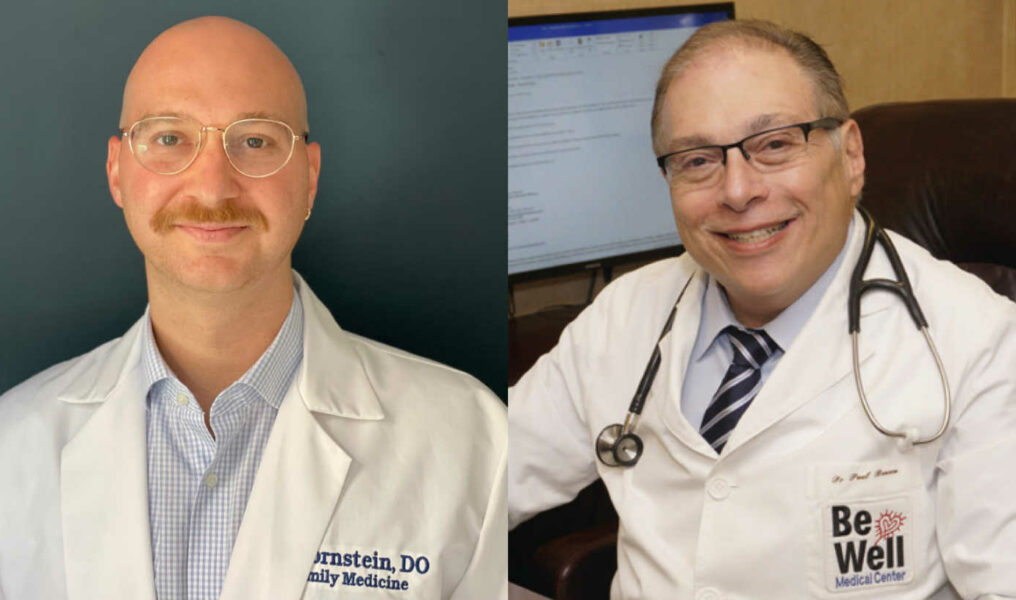April 2023 Advice to Be Well From Dr. Mark Bornstein and Dr. Paul Benson

Hi Doctor, I am newly single and want to get all possible sexually transmitted infection (STI) testing, including testing for herpes today. I want to show my future partners that I am clean. – SL
Hi SL! There is a lot to unpack here. First, we do not like to the use the word “clean” when referring to STIs. If you have an STI, it does not mean you are dirty, it just means that you have an infection. I tell all my patients - STIs are a PART of sex, they are not a CONSEQUENCE of sex. I think it is very important to reframe these conversations this way, especially when talking with future partners.
Now let’s talk about testing for herpes. I am not a fan of testing for herpes from a blood draw. There are only a few scenarios where herpes testing in this way is warranted.
For some background, herpes is caused by the herpes simplex virus (HSV). There are two types, HSV-1 and HSV-2. HSV-1 is the virus that is typically on the mouth and is what many people refer to as cold sores. HSV-2 is the virus that is typically on the genitals and is what many people refer to as genital herpes. Due to sexual practices, both HSV-1 and HSV-2 can cause infections on the mouth AND genitals although they do typically like to stay in their preferred region of the body.
If you ever have a rash on either your mouth or genitals, especially if the rash is uncomfortable, and are concerned for HSV, please come in and we will swab the lesion. This is the best way to test for HSV.
Testing for HSV in the blood is not recommended for many reasons. First, it is not a good test. The positive predictive value for testing for HSV-2 is only 50%! That means that if we test you and it is positive, there is only a 50% chance that you actually have the disease, a true flip of the coin! Second, the test is an antibody test. That means that it is really just telling you if you have ever been exposed to herpes. It is very common to have been exposed and never have an outbreak. In this scenario, what does it really mean for you if you have been exposed at one time and never had an outbreak? Last, is stigma. This is what I am most passionate about. The stigma regarding HSV is truly unfortunate and dangerous. For some reason, likely that it is not curable, HSV has a stigma unlike other STIs. People are shamed, ridiculed, and the butt of the joke for having HSV. This is an STI that virtually has no other consequences except for pain for a couple of days during an outbreak. Conversely, other STIs including chlamydia, gonorrhea, HPV all have more potential dire outcomes. Now I am a huge proponent of destigmatizing ALL STIs, and I believe it is great for our society that many STIs do not have stigma. However, HSV needs to be in this group and when compared to other STIs as the negative effects of it are truly miniscule.
I hope this helps make you feel more comfortable in getting back out in the dating world and having conversations about STIs with future partners. Remember, STIs are a part of sex and no one is ever “dirty” for having one.
Hello Doctor, My best friend who is 40 years old just left the hospital after having a stroke. He is now living in a rehabilitation center. He is unable to use his muscles on the left side of his body. Everyone thought he was a very healthy person and his stroke was quite an unexpected surprise and concerning to his family and friends. We don’t know what we should be doing regarding his care in the future. Are there warning signs to deal with strokes preventively? Thanks! – AW
Dear AW,
Cerebral Vascular Accidents, also known as strokes, can be mild or severe. Most of them are caused by small blood clots entering the brain. Less common is bleeding from a rupture of a blood vessel in the brain. The commonality is loss of blood flow to the affected region in the brain, causing tissue injury or tissue death. To an extent, depending on the severity, there is a variable rehabilitation potential, and that usually takes time and therapy. Many times a stroke can be prevented. There is not a unified screening program for the average person to determine stroke risk. We should be paying more attention to this, especially as one gets older, to identify and mitigate stroke risk factors. Attention to blood pressure, weight, cholesterol, and sugar, can reduce one’s risk for stroke. Headaches, short episodes of loss of neurologic function, dizziness can also be signs of stroke risk. The medical providers at the Be Well Medical Center just released a podcast book review on “How to Prevent a Stroke”. It will give you a lot of valuable information. The link to this podcast is https://spotifyanchor-web.app.link/e/c9yVXypKvyb.
Since 1980 Dr. Paul Benson’s Be Well Medical Center has been an inclusive medical center celebrating diversity. Do you have a health related question for Dr. Paul Benson and Dr. Mark Bornstein? Submit your questions to [email protected]. This article is a sponsored editorial produced in collaboration with Be Well Medical Center. Between The Lines’s journalism is made possible with the support and partnership of advertisers like Be Well. Learn more about Be Well here.




